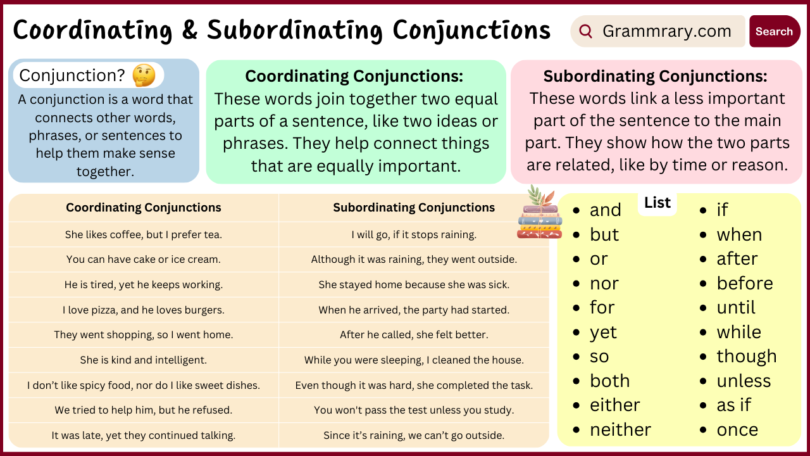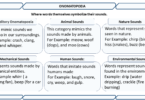What Are Conjunctions?
Conjunctions are words that connect clauses, phrases, or words in a sentence. They help in structuring sentences and creating complex ideas. There are two main types of conjunctions: coordinating and subordinating. Each serves a specific role in making sentences clear and meaningful.
Coordinating Conjunctions
What Are Coordinating Conjunctions?
Coordinating conjunctions connect words, phrases, or independent clauses of equal importance. These conjunctions create a balance between the parts of a sentence, ensuring both ideas hold the same weight.
Common Coordinating Conjunctions
There are seven coordinating conjunctions in English, often remembered by the acronym FANBOYS:
- For
- And
- Nor
- But
- Or
- Yet
- So
Examples of Coordinating Conjunctions in Sentences
| Conjunction | Example |
|---|---|
| For | I stayed home, for it was raining. |
| And | She loves dancing and singing. |
| Nor | He didn’t like coffee, nor did he enjoy tea. |
| But | She wanted to go, but she was tired. |
| Or | Would you like coffee or tea? |
| Yet | It’s cold, yet I’m going for a walk. |
| So | She was hungry, so she made dinner. |
How Coordinating Conjunctions Work
Coordinating conjunctions join two ideas that are equally important. For example:
- I wanted to watch a movie, but I was too tired.
Here, both “watching a movie” and “being tired” are important and are given equal emphasis in the sentence.
Subordinating Conjunctions
What Are Subordinating Conjunctions?
Subordinating conjunctions connect an independent clause with a dependent clause. The dependent clause cannot stand alone and needs the main clause to make sense. Subordinating conjunctions help to show the relationship between the two clauses, such as cause and effect, contrast, time, or condition.
Common Subordinating Conjunctions
Here is a list of some of the most common subordinating conjunctions:
- Because
- Although
- Since
- If
- When
- While
- Unless
- After
- Before
- Though
Examples of Subordinating Conjunctions in Sentences
| Conjunction | Example |
|---|---|
| Because | She left early because she felt sick. |
| Although | Although it was raining, we went out. |
| Since | Since you’re here, let’s start the meeting. |
| If | If you study hard, you will pass the test. |
| When | When I called, she was sleeping. |
| While | While I was cooking, the phone rang. |
| Unless | You won’t succeed unless you try. |
| After | After the show, we went to dinner. |
| Before | Finish your homework before you go out. |
| Though | Though it was difficult, they completed the project. |
How Subordinating Conjunctions Work
Subordinating conjunctions link a dependent clause to an independent clause, creating a relationship between the two ideas. For example:
- I stayed home because it was raining.
Here, the dependent clause “because it was raining” explains why the action in the independent clause “I stayed home” happened. The two parts are not of equal importance, as the reason is dependent on the action.
Key Differences Between Coordinating and Subordinating Conjunctions
| Aspect | Coordinating Conjunctions | Subordinating Conjunctions |
|---|---|---|
| Purpose | Connects equal clauses or words. | Connects a dependent clause to an independent clause. |
| Clauses Joined | Both are of equal importance. | The dependent clause relies on the independent clause. |
| Examples | And, But, Or, Yet, So. | Because, Although, If, When, Since. |
| Sentence Structure | Independent clause + Independent clause. | Independent clause + Dependent clause. |
Tips for Using Coordinating and Subordinating Conjunctions
- Coordinating conjunctions are best used to connect simple ideas, lists, or similar types of information. Keep in mind the FANBOYS acronym for quick recall.
- Subordinating conjunctions help you express more complex relationships between ideas, like cause and effect or time. These are especially useful when explaining or clarifying an idea.
- Use a comma before a coordinating conjunction when connecting two independent clauses. For example:
- She was tired, but she continued working.
- No comma is needed before a subordinating conjunction unless the dependent clause comes before the independent clause:
- Because it was late, we went home.
- We went home because it was late. (No comma)
Coordinating and Subordinating Conjunctions Examples
| Coordinating Conjunction Sentences | Subordinating Conjunction Sentences |
|---|---|
| I like pizza, and I like pasta. | I stayed home because it was raining. |
| She can dance, but she won’t perform. | Although it was late, we kept working. |
| You can go out or stay home. | If you finish early, call me. |
| I was tired, so I went to bed. | She hasn’t been here since Tuesday. |
| He didn’t call, nor did he text. | When he called, I answered quickly. |
| She likes coffee, but I prefer tea. | I cooked dinner while he cleaned. |
| You can walk or take a bus. | Don’t leave unless you tell me. |
| He studied hard, and he passed the test. | Wash your hands before eating. |
| It was cold, yet we went outside. | We will leave after dinner. |
| She didn’t win, but she tried hard. | Though it’s cold, he went swimming. |
| We need milk, and we need eggs. | Stay here until I come back. |
| You can choose or I will decide. | Even though she’s tired, she keeps going. |
| He was late, yet he didn’t rush. | As we left, the rain started. |
| I’ll stay, but I don’t want to. | Call me once you arrive. |
| He’s tall, and he plays basketball. | She will help whether you ask or not. |
| It’s sunny, but it’s still cold. | Take your jacket in case it rains. |
| I have no money, nor do I have time. | He smiled though he was nervous. |
| We’re late, so we need to hurry. | I’m happy because I passed the exam. |
| She’s busy, but she will help. | Since it’s your birthday, let’s celebrate. |
| He is rich, yet unhappy. | I’ll clean up after they leave. |
Coordinating and Subordinating Conjunctions lists
List of Coordinating Conjunctions
- And
- But
- Or
- So
- Nor
- Yet
- For
- And
- But
- Or
- Nor
- So
- Yet
- For
- And
- But
- Or
- Nor
- Yet
list of Subordinating Conjunctions
- Because
- Although
- If
- Since
- When
- While
- Unless
- Before
- After
- Though
- Until
- Even though
- As
- Once
- Whether
- In case
- Though
- Because
- Since
- After
Learn also:










